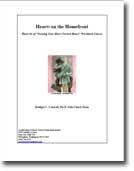Military Families: Preparing for Your Troop's Return Home
 Hearts Toward Home International is the brainchild of Bridget C Cantrell, Ph.D. She is a leading clinical psychologist specializing in the area of combat-related PTSD, and has set up a workbook/counseling program which supports families supporting returning troops. A free chapter of the Turning Your Heart Toward Home program is available online. I'll share some of the ideas found in this excellent resource with you today.
Hearts Toward Home International is the brainchild of Bridget C Cantrell, Ph.D. She is a leading clinical psychologist specializing in the area of combat-related PTSD, and has set up a workbook/counseling program which supports families supporting returning troops. A free chapter of the Turning Your Heart Toward Home program is available online. I'll share some of the ideas found in this excellent resource with you today.
Click on 'Article Link' below tags for more...
From the Hearts Toward Home website:Perhaps we now have the opportunity to make up the ground we lost when our troops came home from previous wars. “Turning Your Heart Toward Home” is a course that utilizes many lessons learned from the past. It provides tools for warriors to reintegrate with their loved ones upon returning from their military assignments.
The combination of educational skills and experiences have structured this powerful course entitled “Turning Your Heart Toward Home”. This vital information addresses and resolves many of the destructive issues surrounding relationship reintegration when soldiers return home from war. During the course, war veterans and family members alike are directed to the core concerns that work against healthy reconnections. Using step-by-step inventories participants are guided toward rebuilding healthy relationships.
The excerpt that I'll share with you today answers the question every military family member struggles with: What can I do to prepare for the return of my troop?The very first thing you need to do is prepare yourself mentally for the changes and differences that will prevail for a while in your relationship. As much as we all want things to go back to the way they were before deployment, realize this is an unreal expectation. To think that you and your loved [one] can go back to square one and pick up where you left off is setting yourself up for a loss. Time has passed, lives have changed. Be progressive and stay focused in the here and now.
Download your own copy of the first chapter to find more helpful advice. And be patient with your troop -- and yourself.
Here are some ways to prepare. Discuss them as a group and list out productive coping methods:
Related Posts


